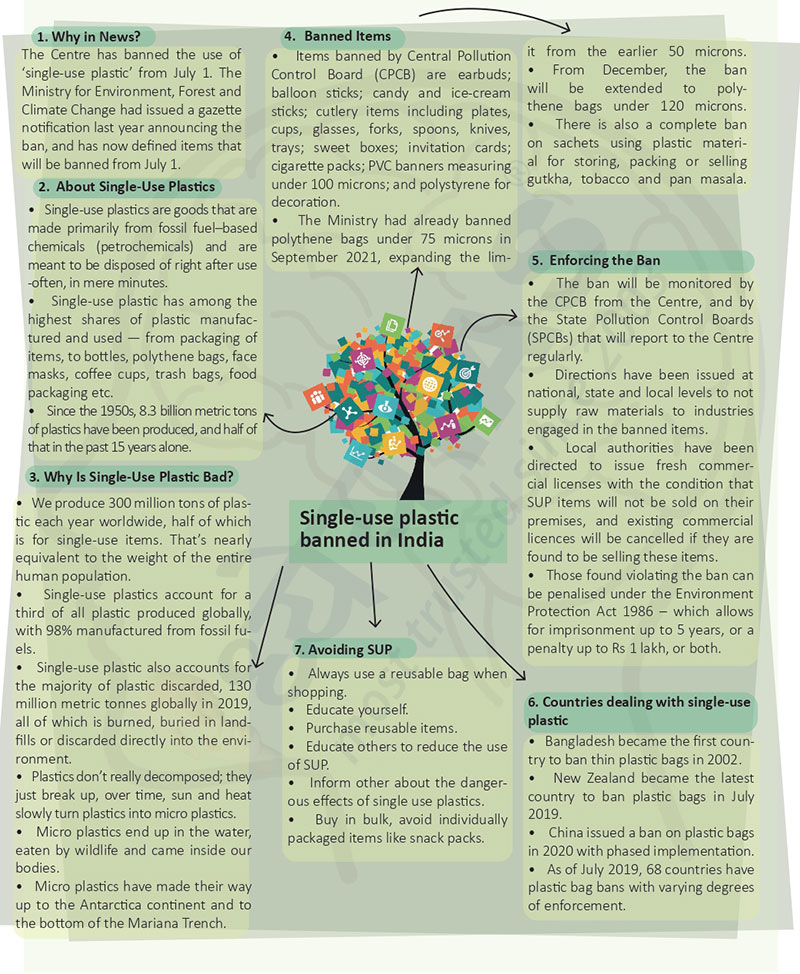Brain-booster /
08 Jul 2022
Brain Booster for UPSC & State PCS Examination (Topic: Single-use plastic banned in India)

Why in News?
- The Centre has banned the use of ‘single-use plastic’ from July 1. The
Ministry for Environment, Forest and Climate Change had issued a gazette
notification last year announcing the ban, and has now defined items that
will be banned from July 1.
About Single-Use Plastics
- Single-use plastics are goods that are made primarily from fossil
fuel–based chemicals (petrochemicals) and are meant to be disposed of right
after use -often, ni mere minutes.
- Single-use plastic has among the highest shares of plastic manufactured
and used — from packaging of items, to bottles, polythene bags, face masks,
coffee cups, trash bags, food packaging etc.
- Since the 1950s, 8.3 billion metric tons of plastics have been produced,
and half of that ni hte apst 51 eyars aolne.
Why is Single-Use Plastic Bad?
- We produce 300 million tons of plastic each year worldwide, half of
which is for single-use items. That’s nearly equivalent to the weight of the
entire human population.
- Single-use plastics account for a third of all plastic produced
globally, with 98% manufactured from fossil fuels.
- Single-use plastic also accounts for the majority of plastic discarded,
130 million metric tonnes globally in 2019, all of which is burned, buried
in landfills or discarded directly into the environment.
- Plastics don’t really decomposed; they just break up, over time, sun and
heat slowly turn plastics into micro plastics.
- Micro plastics end up in the water, eaten by wildlife and came inside
our bodies.
- Micro plastics have made their way up to the Antarctica continent and to
the bottom of the Mariana Trench.
Banned Items
- Items banned by Central Pollution Control Board (CPCB) are earbuds;
balloon sticks; candy and ice-cream sticks; cutlery items including plates,
cups, glasses, forks, spoons, knives, trays; sweet boxes; invitation cards;
cigarette packs; PVC banners measuring under 100 microns; and polystyrene
for decoration.
- The Ministry had already banned polythene bags under 75 microns in
September 2021, expanding the limit from the earlier 50 microns.
- From December, the ban will be extended to polythene bags under 120
microns.
- There is also a complete ban on sachets using plastic material for
storing, packing or selling gutkha, tobacco and pan masala.
Enforcing the Ban
- The ban will be monitored by the CPCB from the Centre, and by the State
Pollution Control Boards (SPCBs) that will report to the Centre regularly.
- Directions have been issued at national, state and local levels to not
supply raw materials to industries engaged in the banned items.
- Local authorities have been directed to issue fresh commercial licenses
with the condition that SUP items will not be sold on their premises, and
existing commercial licences will be cancelled if they are found to be
selling these items.
- Those found violating the ban can be penalised under the Environment
Protection Act 1986 – which allows for imprisonment up to 5 years, or a
penalty up to Rs 1 lakh, or both.
Countries dealing with single-use plastic
- Bangladesh became the first country to ban thin plastic bags in 2002.
- New Zealand became the latest country to ban plastic bags in July 2019.
- China issued a ban on plastic bags in 2020 with phased implementation.
- As of July 2019, 68 countries have plastic bag bans with varying degrees
of enforcement.
Avoiding SUP
- Always use a reusable bag when shopping.
- Educate yourself.
- Purchase reusable items.
- Educate others to reduce the use of SUP.
- Inform other about the dangerous effects of single use plastics.
- Buy in bulk, avoid individually packaged items like snack packs.









